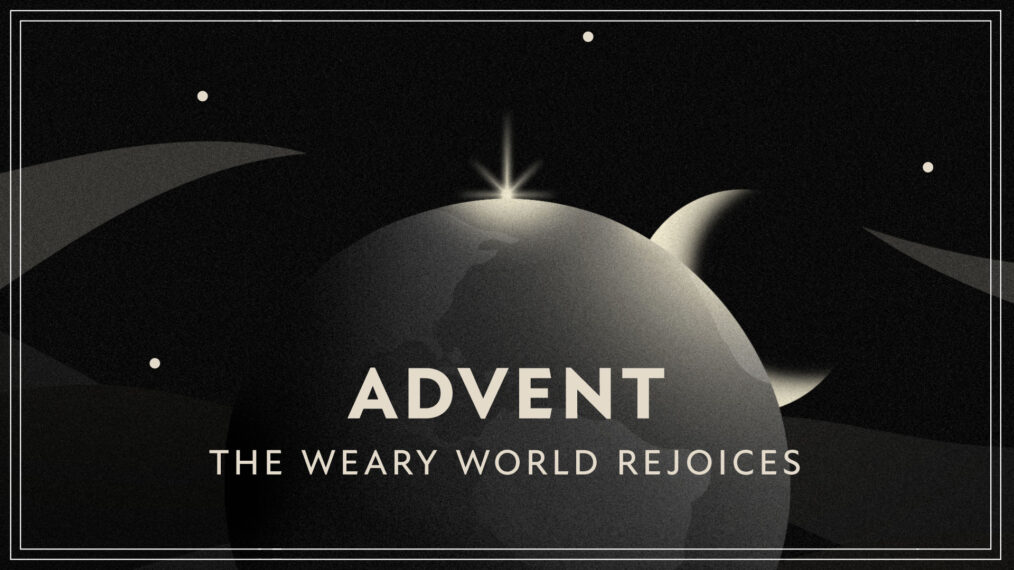Our artwork for Advent and Christmas Eve this year is by Noel Shiveley. These pieces complete the series Noel has done for us this year within the church calendar (also including Lent, Palm Sunday, Good Friday, and Easter—see below). But what does the artwork mean?
the series as a whole
In each piece, including Advent and Christmas Eve, a wide “landscape” is pictured. From the outside edges in, rolling hills, jagged deserts, or the ethereal cosmos center a symbolic item and a celestial body. The symbols each focus on life as it is traditionally considered in its liturgical season. For example, Ash Wednesday depicts ashes blown from a censer (life as temporary, fleeting; Psalm 90:3, 10), while Palm Sunday shows a budding tree in front of a gate cracked open (new life imminently coming; Mark 13:28).
“the weary world rejoices”
Our series for Advent this year has been “The Weary World Rejoices.” Our intent is first to make space in our hearts to feel the tension and dissonance of our weary world (this will be easier for some than for others) while also looking to Jesus as the one who took on flesh to secure the promise of a better future here: a future where the disillusioned can have hope, where the divided can find peace, where the suffering can experience joy, and where the self-centered and outraged can know love.
Advent
A shadowed world is centered low, hung in a mostly-empty cosmos. Space is clouded, and the space dust is somewhat serpentine, covering stars. Sources of light are partially obscured, but clearly coming—a dark world, but not for much longer (John 1: 9). As the four weeks of Advent progress, the artwork depicted on our bulletins and screens changes to show a rising moon and star. The symbolism for life is somewhat direct: the world is conflicted and gloomed, and all life therein waits for the light. Even more directly, the Bethlehem star is depicted. Though it was a symbol in the sky to guide those seeking to meet Jesus, it was not a “symbol” in that it was a real celestial event—baffling the experts then as it may even now. Such was the first coming of Jesus.
Christmas eve
A depiction of Bethlehem is shown under complex light—the tops of towers are lit; the streets are dark. Feelings of sunrise are suggested (one who considers the last art piece might say, “at last!”), but the barren desert hills around still depict a cold nighttime. John writes that “the true light which gives life to everyone was coming into the world,” but also that “the light shines in the darkness…” (John 1:4–5). As we now know, “the darkness has not overcome it,” but what tension on that night! Why such squalor for this King? Who is this family? Did these shepherds really get a personal invitation from angels?
The artist
Noel Shiveley was born in Pasadena, CA. He first started sharing his graphic design work on Instagram in 2012 under @noeltheartist. This account is now a favorite to many, using his design to blend fun social commentary, Gospel snippets, random illustrations, and his professional portfolio. This is how we found him for this project! Noel now lives with his wife Bethany in Colorado Springs where Noel serves as Worship Director for YWAM Colorado Springs.
The series to date
Click an image to enlarge. All images Copyright Park Church 2020–2021.

Ash Wednesday

Palm Sunday

Good Friday

Easter

Advent

Christmas Eve








